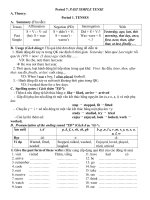past perfect tense
Bạn đang xem bản rút gọn của tài liệu. Xem và tải ngay bản đầy đủ của tài liệu tại đây (72.85 KB, 5 trang )
Test 1
I. Supply the correct form of verb
1. She (light) before I came home
2. We (go) out before 10 pm last night.
3. LAN (grow) flower before 7 am last Monday.
4. The thief (break) into my house before I came home.
5. He (come) in before I invited her.
6. She (get) married before She studied in university.
7. I (make) decision before yesterday.
8. LAN (cook) before I slept the day before yesterday.
9. I (be) ill before I came here.
10. He (win) before they came.
11. He (tell) the truth before they forced him.
12. He (steal) my money before I hint it.
13. My father (finish) his work before lunch time.
14. John (go) away before his parents punished him.
15. Yesterday If I (know) her, I would have helped her a lot.
16. The party chairman only (make) a statement after there (be) a lot of speculation in the
press.
17. Helen (receive) hospital treatment for a year before the doctors finally (tell) her their
diagnosis.
18. Sharon eventually (find) the job she (want) last year, although she (graduate) the year
before.
19. When the doctors (arrive) at the scene of the accident, he (realize) victim sill
(breathe)
20. I suddenly (recognize) the tow square. I (be) there ten years before.
II. Find out the mistake and correct them.
1. I had ran before you called me.
a b c d
2. I had hidden your wallet before you find it.
a b c d
3. Mary had dug before you plant trees.
a b c d
4. I had have wonderful love before you appeared in my life.
a b c d
5. I had burnt my body before you say good bye with me.
a b c d
6. My aunt work in London before she had moved to Norwich.
a b c d
7. The Norwegians planted their flag at the summit just before the British team arrived.
a b c d
8. By the time I come, they had finished watching film.
a b c d
9. I felt as if I betrayed a confidence.
a b c d
10. Yesterday I wished I have money.
a b c d
11. I thought as though he hasn't eaten anything.
a b c d
12. LAN wished she had pass the exanimation.
a b c d
13. After he come home, he continued going.
a b c d
14. I doubted as if she leave home.
a b c d
15. She had be ill before I came.
a b c d
16. After they had gone, I sit down and rested.
a b c d
17. Before she watched TV, she did her homework.
a b c d
18. When we came to the stadium, the match has already begun.
a b c d
19. She said that she had already see Derrick.
a b c d
20. They told me they hadn't ate such kind of food before.
a b c d
21. LAN said to me that she has met her boyfriend.
a b c d
22. I has come home before you had accident.
a b c d
23. He told that he had meet a ghost the day before yesterday.
a b c d
III. GIVE THE RIGHT FORM OF THE VERBS IN BRACKETS : S. PAST, PAST
III. GIVE THE RIGHT FORM OF THE VERBS IN BRACKETS : S. PAST, PAST
PERFECT (cont.) or PAST CONTINUOUS
PERFECT (cont.) or PAST CONTINUOUS
1 . They (go) home after they (finish) their work.
1 . They (go) home after they (finish) their work.
2 . He (do) nothing before he (see) me.
2 . He (do) nothing before he (see) me.
3 . He (thank) me for what I (do) for him.
3 . He (thank) me for what I (do) for him.
4 . I (be) sorry that I (hurt) him.
4 . I (be) sorry that I (hurt) him.
5 . I (not, see) my friend for ages when I (catch) sight of him this morning.
5 . I (not, see) my friend for ages when I (catch) sight of him this morning.
6 . You (wear) your new hat when I (meet) you yesterday.
6 . You (wear) your new hat when I (meet) you yesterday.
7 . The house (be) much smaller than he (think) at first.
7 . The house (be) much smaller than he (think) at first.
8 . Before you (mention) him, I (never, hear) of that author.
8 . Before you (mention) him, I (never, hear) of that author.
9 . When I (go) to see them last night, they (play) cards. The (say) they (play) cards
9 . When I (go) to see them last night, they (play) cards. The (say) they (play) cards
since six o’clock.
since six o’clock.
10. The little girl (ask) what (happen) to her ice-cream.
10. The little girl (ask) what (happen) to her ice-cream.
11. They (ask) why we (come) so early.
11. They (ask) why we (come) so early.
12. While you (play) the piano, I (write) a letter.
12. While you (play) the piano, I (write) a letter.
13. They (sell) all the books when we (get) there.
13. They (sell) all the books when we (get) there.
14. He (sleep) , so he (not, hear) what you said to him.
14. He (sleep) , so he (not, hear) what you said to him.
15. Tom was very tired because he (run) for an hour.
15. Tom was very tired because he (run) for an hour.
IV. GIVE THE RIGHT FORM OF THE VERBS IN BRACKETS : SIMPLE PAST
IV. GIVE THE RIGHT FORM OF THE VERBS IN BRACKETS : SIMPLE PAST
or PRESENT PERFECT
or PRESENT PERFECT
1 . We (study) a very hard lesson the day before yesterday.
1 . We (study) a very hard lesson the day before yesterday.
2 . We (study) almost every lesson in this book so far.
2 . We (study) almost every lesson in this book so far.
3 . We (watch, never) that television program.
3 . We (watch, never) that television program.
4 . We (watch) an interesting program on TV last night.
4 . We (watch) an interesting program on TV last night.
5 . My wife and I (travel) by air many times in the past.
5 . My wife and I (travel) by air many times in the past.
6 . My wife and I (travel) to Mexico by air last summer vacation.
6 . My wife and I (travel) to Mexico by air last summer vacation.
7 . I (read) that novel by Hemingway several times before.
7 . I (read) that novel by Hemingway several times before.
8 . I (not, see) him for three weeks. I wonder where he is.
8 . I (not, see) him for three weeks. I wonder where he is.
9 . The concert (begin) at 2.30 and (last) for two hours. Everyone (enjoy) it very much.
9 . The concert (begin) at 2.30 and (last) for two hours. Everyone (enjoy) it very much.
10. The play (just, begin). You’re a little late.
10. The play (just, begin). You’re a little late.
11. Mr. Count (work) as a cashier for 25 years. Then he (retire) and (go) to live in the
11. Mr. Count (work) as a cashier for 25 years. Then he (retire) and (go) to live in the
countryside.
countryside.
12. We (miss) the bus. Now we have to walk.
12. We (miss) the bus. Now we have to walk.
13. I (not,see) him since last Monday.
13. I (not,see) him since last Monday.
14. I (never, read) such an interesting story in my life.
14. I (never, read) such an interesting story in my life.
15. How many films you (see) this month?
15. How many films you (see) this month?
16. His health (improve) since he (leave) India.
16. His health (improve) since he (leave) India.
V. Read the passage and do the tasks that follow. (3 pts)
The computer is a wonderful machine. It is the most important invention. Almost every
profession now uses computers. They are used in science, industry, business, medicine,
and education. The oldest kind of computer has been used in China since the sixth
century. In the 17th century an adding machine was invented. The first large, modern
computer was built in 1937.
Computers improved quickly. A few years later a computer could do 5,000 additions
per second. Today all computers have a processing unit, an arithmetic and logic unit, and
a memory. Computers are getting smaller and smaller, and computing faster and faster.
Even in a very large computer, the part that does the actual computing is about the size of
the end of a finger.
Computers can work together – they can network with each other. The worldwide
computer network is called the Internet. Using Internet, you can find all kinds of
information and news from people and countries around the world.
Complete the sentences.
1. Since the 6th century ………………………………………
2. In the 17th century …………………………………………
3. In 1937 ………………………………………………………
Answer the questions.
4.What parts do all computers have today?
………………………………………………………………
5. How small is a very large computer’s part that does the actual computing?
……………………………………….
6. What is the main advantage of using Internet?
…………………………………………………………………….
VI. Read the passage below and answer the questions.
In the United States, people celebrate Mother’s Day and Father’s day. Mother’s day is
celebrated on the second Sunday in May. On this occasion, mother usually receives greeting cards
and gifts from her husband and children. The best gift of all for an American Mom is a day of
leisure. The majority of American mothers have outside jobs as well as housework, so their
working days are often very hard. The working mother enjoys the traditional Mother’s Day
custom of breakfast (or brunch) cooked by her family and served to her on a tray in bed. Later in
the day, it’s also traditional for the extended family group to get together for dinner, either in a
restaurant or in one of their homes.
Flowers are an important part of Mother’s Day. Mothers are often given a corsage or a
plant for the occasion, particularly if they are elderly.
Father’s Day is celebrated through out the United States and Canada on the third Sunday
in June. The holiday customs are similar to Mother’s day. Dad also receives greeting cards and
gifts from his family and enjoys a day of leisure.
1. When do American people celebrate Mother’s day and Father’s Day?
2. What kinds of gifts does the mother often get from her family members?
3. What kinds of gift does she love most?
4. Why are mothers’ working days often very hard?
5. Where do the family members have their dinner party on this occasion?
6. What are the similar things that father gets on Father’s Day?









